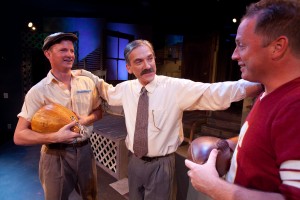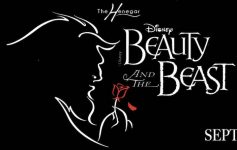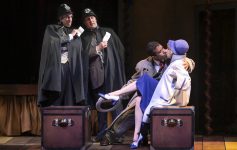
Mad Cow Theatre “Death of a Salesman,” left to right, Daniel Cooksley (Happy Loman), Eric Zivot (Willy Loman) and Matt Horohoe (Biff Loman)
By PAM HARBAUGH
With its resonating and masterfully acted production of Arthur Miller’s “Death of a Salesman,” Mad Cow Theatre reminds us of the depth and power of classic American drama.
The 1949 drama won a Pulitzer Prize and a Tony Award for its depiction of an American tragedy embodied by traveling salesman Willy Loman. Its universality is not lost on today’s audiences as this “low man” struggles to maintain dignity in a world that’s squeezing him out.
In the drama’s first moments, Willy Loman lumbers slowly onto the stage, weighed down by two large suitcases, symbolic of a life spent on the road. It is late at night. He moves through his small kitchen, up the tight staircase and into the tiny room shared with his wife, Linda. He sits on the bed and she fusses about him, taking off his shoes, slipping off his jacket, so tenderly happy to have her husband home again. In another small room sleep their grown sons, Biff and Happy, who add to the crowded climate.
Layered into the real time story line, flashbacks show the shady strata on which Loman’s crumbling world was built. Director Timothy Williams clearly tells this story while it folds into itself and out again, forging a kaleidoscopic look at Loman’s delusional life.
Lighting designer Joseph P. Oshry advances the flashback conceit smartly using rear projections to shift time. The setting goes from modern skyscrapers crowding out Loman’s out-dated house to a past when green trees lined Loman’s neighborhood and there was enough sunlight to plant a garden in the backyard.
Scenic designer William Elliot creates a tight, claustrophobic setting, evocative of Jo Mielziner’s design in Elia Kazan’s 1949 production (and again in Mike Nichols’ 2012 production). It is this constricting setting that forces confrontation and helps electrify the scenes enacted by this top rate cast.
And what a cast.
Eric Zivot disappears into the role of Willy. He brings believable life to this complicated character, and, all the while, makes it look so doggoned easy. In one moment, he rhapsodizes about how life once was, deluding himself into a reality that was never there. In another moment, he lashes out with anger at his wife. Then another, tells Biff that life can be a bowl full of cherries, as long as they like you. Mr. Zivot’s Loman is a man who sells the hope of the American dream, but is haunted by his past and a stillborn future.
Robin Olson’s Linda is a delicate, loving woman who never sees that her husband uses her as a doormat. She’s his foundation, he says before slipping away to another woman. Her Linda is never hurt. Indeed, “attention must be paid” to the man who has worked for 36 years, she tells her sons.
Matt Horohoe squeezes every drop possible out of each moment in his vivid portrayal of Biff, the only Loman not drowning in self-deception. A former high school football star who is failing at life, Biff has returned home because he has no place left to go. With Mr. Horohoe’s depth of performance and intense interpretation of Biff, the play feels like it’s as much about Biff as it is Willy. In fact, it is the scene when Biff tells his father to stop yelling at his mother that brings chills. And it is the scene when Biff says goodbye that brings tears.
Daniel Crooksley correctly paints an unsympathetic portrayal of Happy, the younger brother who could never catch his father’s attention. Ironically, it is Happy that treads his father’s footsteps. Happy treats women as objects, has grand ideas how he’s going to make money and is almost as delusional as Willy.
Other standouts include: Peter Travis as Bernard, who, in a flashback, is a nerdy delight trying to get Biff to study for a big math test; Thom Mesrobian as kind-hearted Charley; and Mark Edward Smith as Ben, Willy’s successful brother who Willy imagines telling him to come with him and make his mark.
Don’t be surprised if this production leaves you wanting to see more by the likes of Miller and his brethren, Tennessee Williams and Eugene O’Neill. This is great, big, American drama. And it just does not get any better done that this at Mad Cow.
Photograph courtesy of Mad Cow Theatre
SIDE O’ GRITS: “Death of a Salesman” runs through Aug. 25 at Mad Cow Theatre, 54 West Church Street, Orlando. Tickets are $14 to $32. Call 407-297-8788 or visit www.madcowtheatre.com.










